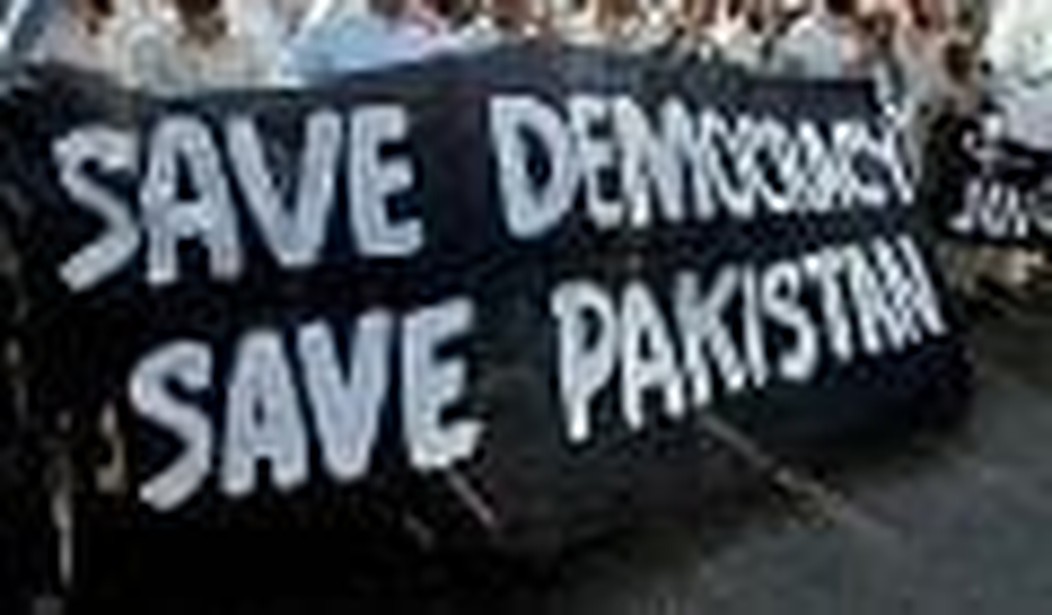Few Pakistanis believe that the scheduled February 18 general elections will be free and fair enough to provide order in the chaotic situation following the assassination of Benazir Bhutto. Several political parties which took part in previous elections have decided to boycott the elections, saying they do not expect them to be fair. The major opposition political parties PPP and PML-N are already pointing out major irregularities, which they categorize as pre-poll rigging.
As the fateful day for future government in Pakistan approaches, the election campaign should be at its peak. Yet, the intensity of election activities is not even close to what the levels used to be in the past, reflecting the public air of skepticism and distrust — and fear of continuing election-related violence.
Political parties are making big promises, but the election rallies always associated with Pakistani elections are not drawing major crowds and door-to-door canvassing is quite tepid. Most of the current electioneering is done through banners and hoarding all over the country, not a single street or path empty from such promotional banners. If one looked at Pakistan from the skies it would seem as if the entire country is clad with political leaders’ slogans.
Most independent observers agree that the pre-election conditions are heavily tilted in favor of the outgoing pro-Musharraf government. Musharraf must receive a majority in parliament to block moves for his impeachment.
A caretaker government is officially in place to oversee the elections but serious questions have been raised as to their neutrality. Many members of the caretaker government are members of the outgoing party and openly assisting their party candidates. The caretaker prime minister’s sister and nephew are candidates and opposing candidates have filed complaints against usage of state resources to assist their campaign.
This brings us to the next point — the doubtful neutrality of the Election Commission of Pakistan (ECP.) Meant to be an independent body drawn from the judiciary, it is now rejecting most of the election complaints against pro-Musharraf parties.
This hits hard when the chief justice of the country is held under detention by President Musharraf with no charges and most of the judiciary has been replaced with loyal Musharraf appointees.
Although the “state of emergency” imposed on November 3, 2007, has been lifted, most of the actions taken during that period have been arbitrarily made part of the law and constitution. Essentially, a single person rewrites the constitution and laws to suit himself. The changes imposed include the muzzling of free media in the country. No live broadcasts or election coverage are permitted — raising fears that the government has something to hide.
Contrary to the official rules, large-scale transfers and appointments have taken place in police and election officials, which will directly affect the elections. Many of these appointments and transfers were made in constituencies where pro-Musharraf parties are contesting for seats in parliament. Most complaints against the bias of these officials have gone unanswered or even rejected by the ECP.
All provincial courts (called high courts) now have judges who have taken an oath of allegiance to the president rather than taking an oath by the constitution. A lawyer, Khawaja Naveed, who hosted a “People’s Court”-style reality show on television, is now a judge in Sind High Court. Loyalty rather than professionalism and knowledge of law is the requirement for advancement.
A new police force has been appointed for a single week in Punjab during the elections. Those who are appointed have no local loyalties and they will do whatever the government will ask them. Many new teachers have been appointed in government schools without due procedure. Not much is known about their background — and they have also been asked to perform election duties, notably vote counting.
Other new appointees, deemed political appointments by opposition parties, may influence or affect the proceedings and results of the elections.
All survey polls have indicated dipping popularity for President Musharraf and his coalition of parties. Though aware of the scientific nature of how these polls are conducted, the president and the caretaker government have rejected them and pointed accusing fingers of bias at the International Republican Institute (IRI) and Gallup, who have conducted these polls. The same polls have also predicted high numbers favoring the two main political parties, PPP and PML-N.
After Bhutto’s assassination, her Pakistan Peoples Party (PPP) won the sympathy of many, even those who never appreciated Bhutto. This could lead the party to a victory and the new leader of the party, Asif Zardari, has repeatedly said that the party would avenge the assassination of Ms. Bhutto by the power of the vote.
With a promise to restore the independent judiciary and also to end dictatorship in the country, Nawaz Sharif’s PML-N party is also leading the opinion polls.
The pro-Musharraf parties (PML-Q, MQM, PML-F, and PPP-Sherpao) continue to insist that they will prevail in the upcoming election, despite the discouraging poll numbers, some of which predict these parties would not even get 20% of seats in the assembly.
It is in this context that most believe that the elections will be rigged — and that President Musharraf’s coalition parties will make sure they return to parliament by any means necessary.
Ghalia Aymen is Pakistan correspondent for Pajamas Media.









Join the conversation as a VIP Member